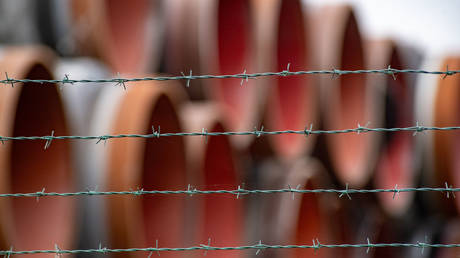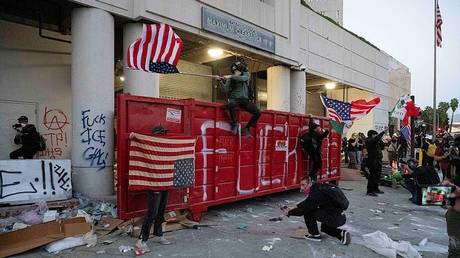
It is too early to determine if it was damaged on purpose, according to the NBI
Finland’s National Bureau of Investigation (NBI) has said that the anchor of a Chinese-registered vessel may be responsible for damage sustained to the Balticconnector gas pipeline earlier this month, though it remains unclear if the act was deliberate.
Speaking at a press conference on Tuesday, an NBI spokesperson said that a large anchor had been retrieved from the seabed close to where the pipeline was damaged in the early hours of October 8. Police said that they are working to establish if the anchor belonged to a Chinese container vessel which had been in the immediate area at the time.
“The next questions are about whether it was intentional, negligence, poor seamanship, and that’s where we get into whether there could be a motive for what’s going on,” NBI Director Robin Lardot told reporters. “But it’s too early to answer that at this stage.”
Police had previously indicated that damage to the Balticconnector pipeline, as well as two undersea telecommunications cables, were caused by blunt external mechanical force and that investigations were ongoing to identify if the damage was caused deliberately.
Investigators added that drag marks were visible on the seabed leading up to the section of pipeline that was damaged. The anchor had become detached from its host vessel and was lying on the seabed immediately after the damaged area.
The NBI said last week that the focus of its investigation had centered on the Chinese container ship NewNew Polar Bear that was in the immediate location at the time of incident.
Finnish police said on Tuesday that it had established that the NewNew Polar Bear was missing one of its front anchors. Photographs of the ship docked in the Russian port of St. Petersburg on October 9, one day after the pipeline was damaged, appears to show irregularities with its anchor system.
On Monday, China called for an “objective, fair, and professional” investigation to be established into the cause of the damaged pipeline and telecoms cables. NATO has increased its patrols in the Baltic Sea following the damage sustained to the pipeline.
The October 8 incident to the pipeline – through which gas flows between Finland and Estonia – has restricted Finland’s gas supplies. Helsinki said that it had made up for any shortfalls with the importation of liquified natural gas (LNG) into its Inkoo port.
In September of last year, the Nord Stream pipelines connecting Russia and Germany were severely damaged by undersea explosions in what authorities declared to be deliberate acts of sabotage. The identity of the attackers has yet to be established.




